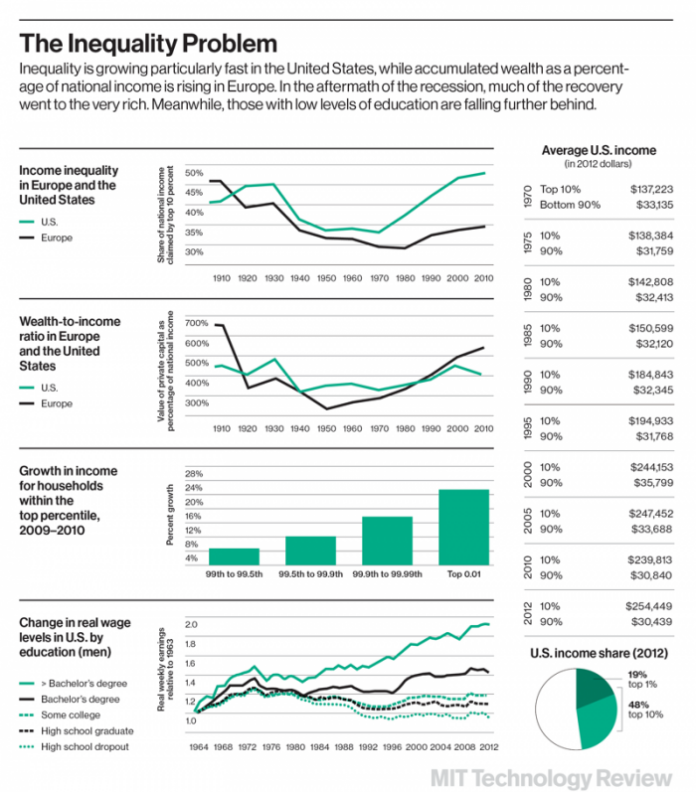The disparity between the rich and everyone else is larger than ever in the United States and increasing in much of Europe. Why?
The signs of the gap—really, a chasm—between the poor and the super-rich are hard to miss in Silicon Valley. On a bustling morning in downtown Palo Alto, the center of today’s technology boom, apparently homeless people and their meager belongings occupy almost every available public bench. Twenty minutes away in San Jose, the largest city in the Valley, a camp of homeless people known as the Jungle—reputed to be the largest in the country—has taken root along a creek within walking distance of Adobe’s headquarters and the gleaming, ultramodern city hall.
The homeless are the most visible signs of poverty in the region. But the numbers back up first impressions. Median income in Silicon Valley reached $94,000 in 2013, far above the national median of around $53,000. Yet an estimated 31 percent of jobs pay $16 per hour or less, below what is needed to support a family in an area with notoriously expensive housing. The poverty rate in Santa Clara County, the heart of Silicon Valley, is around 19 percent, according to calculations that factor in the high cost of living.
Even some of the area’s biggest technology boosters are appalled. “You have people begging in the street on University Avenue [Palo Alto’s main street],” says Vivek Wadhwa, a fellow at Stanford University’s Rock Center for Corporate Governance and at Singularity University, an education corporation in Moffett Field with ties to the elites in Silicon Valley. “It’s like what you see in India,” adds Wadhwa, who was born in Delhi. “Silicon Valley is a look at the future we’re creating, and it’s really disturbing.” Many of those made rich by the recent technology boom, he adds, don’t seem to care about “the mess they’re creating.”
The wealth generated in Silicon Valley is “as prodigious as it has ever been,” says Russell Hancock, president of Joint Venture Silicon Valley, a nonprofit group that promotes regional development. “But when we used to have booms in the tech sector, it would lift all boats. That’s not how it works anymore. And suddenly you’re seeing a backlash and people are upset.” Indeed, people are stoning buses transporting Google employees to work from their homes in San Francisco.
The anger in Northern California and elsewhere in the United States springs from an increasingly obvious reality: the rich are getting richer while many other people are struggling. It’s hard not to wonder whether Silicon Valley, rather than just exemplifying this growing inequality, is actually contributing to it, by producing digital technologies that eliminate the need for many middle-class jobs. Here, technology is arguably evolving faster than anywhere else in the world. Does the region really portend a future, as Wadhwa would have it, in which a few very rich people leave the rest of us hopelessly behind?
Analysis:
This article points out many issues with the continuous transition to digital processes. For one, it is replacing lower and middle-class jobs with technological processes that lower business costs and keep the rich getting richer and leaving many people to struggle. In addition, it is allowing for those who can afford technology to have a more efficient lifestyle, while leaving those who can’t afford it with nowhere to go. This issue is a question of morality and ethics, I believe it is simply not justifiable to live in a world where there is such wealth disparity, a world that is making the issues worse through so-called “innovation.” I am not saying that technology is a bad thing, but when we create new technology, it should be our responsibility to better include all groups in the process, not just those who are young and wealthy. In terms of banking, I question how we can make the technology used in services and processes more accessible for customers, so they are not left to fend for themselves.
Citation:
Rotman, D. (2020, April 2). Technology and Inequality. MIT Technology Review. https://www.technologyreview.com/2014/10/21/170679/technology-and-inequality/




